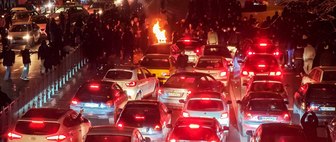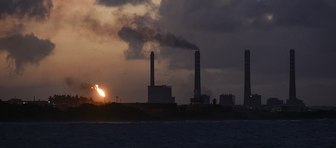Over the past week, while Ukrainian president Volodymyr Zelensky has led his country’s resistance to Russia’s invasion and appealed to other countries for support, Americans’ opinion of him has risen considerably. He is viewed favorably by 44% of Americans and unfavorably by 16%, according to the latest Economist/YouGov Poll, which was conducted after the Russian invasion of Ukraine began. That compares to 29% favorable and 19% unfavorable a week earlier, in a poll conducted before the invasion began. The proportion of Americans who say they don’t know has dropped from 52% to 40%.
Support for Zelensky extends beyond the personal. In a separate YouGov poll this week, 51% of Americans said the European Union should grant his request for Ukraine to be admitted to the EU immediately. Just 14% said the EU should not grant the request.
While Zelensky is growing more popular in the U.S., three-quarters of Americans view Vladimir Putin unfavorably, including 79% of Democrats and 77% of Republicans, slight increases from when we last asked the question the same way a month earlier. Two-thirds view Putin personally as a “serious threat” to the United States.
Two-thirds of Americans call praise of Putin by U.S. leaders “inappropriate.” That includes 77% of Democrats, 64% of Republicans, and 59% of voters for Donald Trump, who in the past week has praised Putin’s “genius” justification for the invasion.
Presented with a list of adjectives as options, two-thirds of Americans say they’d describe Putin as “power-hungry,” while just about half say he is “out of control” (50%), ”greedy” (48%), a “narcissist” (47%), or even “evil” (46%). Democrats and Republicans are equally likely to say Putin is evil.
Fewer chose positive or neutral descriptions for Putin, such as: a strong leader (31%), strategic (31%), and a man who loves his country (20%). Some conservatives have praised Putin on religious grounds. One Republican candidate at last week’s Conservative Political Action Conference said, “I identify more with Putin’s Christian values than I do with Joe Biden.” However, only 5% of Americans and 4% of Republicans call Putin “a Christian.”
More than three-quarters of Americans would choose at least one of four descriptions for Putin that suggest he might not be making rational or predictable choices: power-hungry, out of control, paranoid, or a narcissist. Those who chose one of these descriptors are far more likely to say there is a greater chance of major world conflict compared to five years ago: 63% say so about a world war, 63% about a new Cold War, and 52% about a nuclear war. The comparable percentages for those who wouldn’t assign Putin any of those descriptions are between 33% and 35% for each of those types of conflict. Americans who don’t label Putin as erratic are more likely to say they’re unsure about the relative chances of major world conflict.
The possibility of nuclear war is a cause of concern for 69% of Americans, according to a separate YouGov poll this week: 32% say they are very concerned personally about experiencing nuclear war, while 37% are somewhat concerned. In another survey this week, 72% of Americans said they think Putin is not acting rationally regarding Ukraine; just 11% said they think he is.
While it's unusual for such a high percentage of Americans to agree on anything like they agree on viewing Putin unfavorably, there are some dissenters: 14% say they view him somewhat or very favorably. Putin admirers resist easy categorization by the usual demographic characteristics: the percentage of people who favor Putin sits in a narrow range between 10% and 20% across nearly all subgroups by political party, age, race, region, gender, income, or education. But when it comes to opinions about other aspects of Russia and its attack on Ukraine, Americans with a favorable view of Putin are very different than those who view the Russian leader unfavorably.
Compared to Americans who view Putin unfavorably, Americans who are favorable toward Putin are:
- Less likely to have heard about the invasion (53% have heard a lot, vs. 73% of people who view him unfavorably)
- Less likely to be concerned about the invasion (58% vs. 89%)
- Much more likely to sympathize with Russia in the conflict (27% vs. 2%, though 41% still sympathize with Ukraine)
- Twice as likely to say Russia will win (52% vs. 27%)
- Less likely to be worried about a wider war (53% vs. 71%) but slightly more likely to see a war with the U.S. (52% vs. 45%)
- Less likely to call Russia communist (28% vs. 48%); far more likely to call it capitalist (26% vs. 9%) and a democracy (27% vs. 6%)
- Far more likely to say the Russian people favor the invasion (43% vs. 10%) and far less likely to say they oppose it (32% vs. 62%)
- Far more likely to say the U.S. response to the invasion should be less tough (39% vs. 5%)
- Far more likely to view Ukrainian president Volodymyr Zelensky unfavorably (39% vs. 14%)
- A bit more likely to say Putin is a strong leader (87% vs. 71%)
- Far less likely to say Putin is any of: out of control, power-hungry, a narcissist, or paranoid (44% vs. 89%)
- Far more likely to disapprove of U.S. sanctions against Putin directly (37% vs. 12%)
See the toplines and crosstabs from this Economist/YouGov Poll
Methodology: The Economist survey was conducted by YouGov using a nationally representative sample of 1,500 U.S. adult citizens interviewed online between February 26 - March 1, 2022. This sample was weighted according to gender, age, race, and education based on the 2018 American Community Survey, conducted by the U.S. Census Bureau, as well as 2016 and 2020 Presidential votes (or non-votes). Respondents were selected from YouGov’s opt-in panel to be representative of all U.S. citizens. The margin of error is approximately 3% for the overall sample.
Image: Getty















